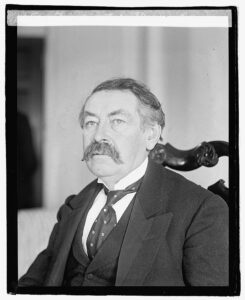Aristide Briand (1862-1932), French lawyer, journalist, politician and Nobel Peace Prize laureate.
© Article written by Gabriel Godeffroy for the Central Europe Foundation
Photo: “Aristide Briand”, 1921, Library of Congress.
After studying Law at the University of Paris, Aristide Briand started his professional career as a lawyer and journalist. In 1902, Briand became a member of the Chamber of Deputies of the French Parliament. After having successfully defended the Law on the Separation of the Churches and the State in 1906, he served as Minister in various governments and was also appointed Prime Minister on several occasions before and during the First World War.
After the war, Aristide Briand became France’s permanent delegate to the League of Nations. From 1921 to 1922, Briand was Prime Minister with the portfolio of Foreign Affairs. From 1925, he did not leave the French Ministry of Foreign Affairs until 1932, shortly before his death, due to health problems. As the French Foreign Minister, Aristide Briand was the architect of the Locarno Agreements, signed in October 1925, which helped to ease Franco-German relations and to stabilize the post-war European political order. For this reason, Briand was awarded the Nobel Peace Prize in December 1926, together with his German counterpart Gustav Stresemann. After the signing of the Briand-Kellog Pact in August 1928, which “outlawed war”, he envisaged the economic and political unification of Europe as the next step in his system of collective security in Europe. In this sense, he supported “Europeanist” organizations, such as the Pan-European Union of Count Richard Coudenhove-Kalergi and the French Committee of the European Customs Union.
In September 1929, Aristide Briand announced his desire to create “a kind of federal bond” between the European peoples in a speech addressed to the General Assembly of the League of Nations. Elemér Hantos believed that “it [was] the idea of the economic unity of Europe and not that of a political Pan-Europe that emerge[d] from Briand’s speeches”. That is why Hantos was disappointed when Briand’s memorandum, presented in May 1930, consecrated the primacy of politics over economics.
Following the announcement of the Austro-German customs union project in March 1931, which marked a turning point in German foreign policy, Aristide Briand presented Elemér Hantos’s memorandum on the economic reorganization of Central Europe to the Study Commission for the European Union of the League of Nations in September 1931.
--"Mort de M. Aristide Briand", Le Temps, 8 mars 1932, p. 1.

